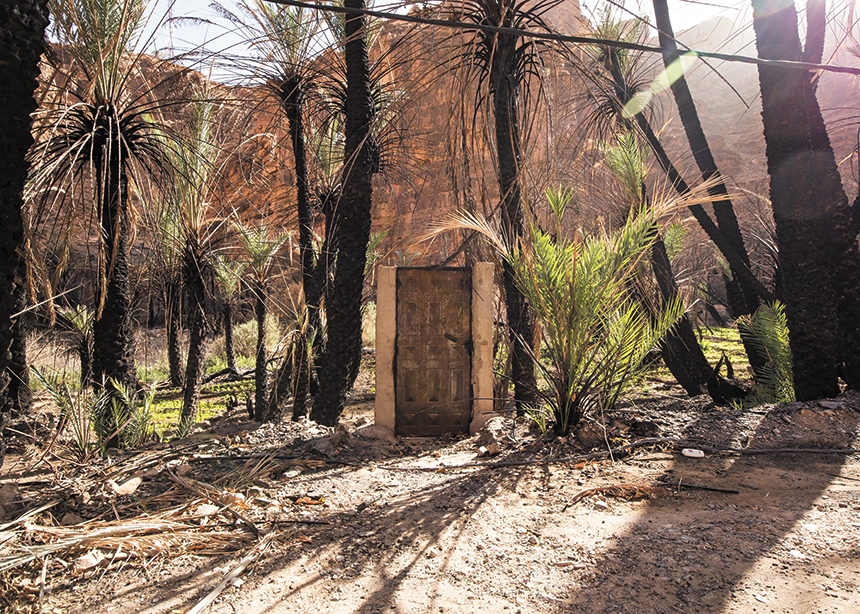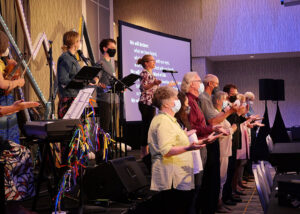When Hymnal: A Worship Book came out in 1992, “What is This Place” was chosen to be the lead hymn in the collection. The first line describes the church building as “Only a house, the earth its floor, walls and a roof . . . , windows for light, an open door.” But when the people enter, “. . . it becomes a body that lives when we are gathered here . . . .”
The closing of church doors across the country in mid-March due to COVID-19 restrictions has scattered this body, causing a mad scramble as congregations across Mennonite Church Canada adapted their worship services to an online format:
- Some offered live-streams.
- Others produced pre-recorded worship services, with leaders standing at a distance from each other in empty sanctuaries.
- Still others used virtual-meeting platforms, like Zoom, to connect congregants for sharing and prayer.
While these efforts certainly do not replace face-to-face greetings from friendly ushers, the spirit-lifting sounds of joyful singing on all sides, or the collective sense of God’s Spirit in the room, they make it possible for congregants to stay connected.
Yet I feel the need to reflect on this moment. I think it is significant. While this scramble to offer digital worship services is understandable, I believe COVID-19 has revealed how “worship-focused” western churches are at the expense of being missional communities. I knew this, but I had not seen it as starkly as I do now.
Most churches offer education, community and service within their body, but worship, by far, is the defining activity for most congregations. When people describe their church, they often talk about how they gather with others on a Sunday morning to sing, pray, read scripture and hear a good sermon. Given our rapid pace of life and the involvements congregants have, Sunday worship is one of the only times that congregations gather, which means only three to four days a month.
Now, with social isolation, how do we maintain our identity as the church when the door has closed on the main activity we do together? Will online worship soon start to feel like Skip the Dishes—the same food but not the same table experience? What does this moment reveal to us about how we practise community?
From Sunday-morning worship to missional community
The prison doors are closed on Paul while he writes his letter to the Colossians. In prison, he prays “that God will open to us a door for the word, that we may declare the mystery of Christ . . . so that I may reveal it clearly, as I should” (Colossians 4:3-4).
He was probably praying that the prison door in front of him would open, but, more so, he was praying for a new opportunity for the mystery of Christ to be revealed beyond the already gathered bodies of believers.
In late 1999 and early 2000, Robert J. (Jack) Suderman, executive secretary of Mennonite Church Canada’s Ministries Commission, wrote a series of six articles for Canadian Mennonite that encouraged a new understanding of mission for the Mennonite church. The “Re-imagine mission” series revealed how little we had been thinking about mission in Canada, that it was not our reflex to pray for a door to open for us to declare the mystery of Christ with neighbours and strangers.
I believe we have yet to fully embrace this understanding as core to who we are. I say this as one who pastored for 27 years. If still in congregational ministry during this pandemic, I would have been the first to rush to prepare online worship for Sunday morning before leaving a note in the mailbox of the elderly widow three doors down to ask if she needed groceries or prescriptions; or contacting single parents at the end of the block who are now apartment-bound with their children, to ask if they have the devices and internet necessary for the kids to do online school work; or simply calling up others whom I know in the community to ask how they are doing.
I wonder today if our forced social isolation is the door I have been praying for. With no Sunday gatherings, the neighbours and strangers around us become our community. For many of us, this may be uncomfortable and frightening, but I believe reaching out to those in need around us can be a door for deeper conversations around meaning, purpose and belonging.
God did not cause the COVID-19 crisis, but God is able to transform even the most terrible circumstances into redemptive ones. Perhaps God is opening a door for us to reach people in ways that might previously have felt intrusive.
Throughout history, the Christian church flourished during times of epidemics and restrictions. Early Christians created community by ministering to their immediate neighbours. These communities worshipped together, but the hallmarks of their identity were acts of love and charity to the lonely, vulnerable and suffering. Likewise, in the 20th century the church grew rapidly when church doors were closed in both Ethiopia and China.
Jeanette Hanson, director of International Witness for MC Canada, writes, “When the church buildings in China were completely closed in the early 1950s, Christians continued to care for one another, welcome new believers, and share their faith in their homes and communities. Bibles hidden in walls and gardens were carefully brought out with people that were trusted to understand the gift of the Scriptures. As churches began to reopen in the early 1980s, there was evidence of exponential growth, as believers came together to celebrate being able to worship openly again.”
If this pandemic is a “door for the word,” do we have the courage to walk through it? If we cross the threshold, it might change us in ways we don’t anticipate. It might be so altering that it changes our very idea of “congregation.”
Congregation to parish
“Congregation” is used in both the Old and New testaments, but it was understood differently than we understand it now. In those times, “congregation” implied a gathering of people living together in one area. When people congregated, there was no commuting, no concept of choosing where to associate or with whom.
Today, particularly in urban settings, we drive past several churches to find a congregation that fits our desires, that has the people we want to meet with. The idea of being missional has not become a lived reality for many of our Eurocentric congregations. As long as we uphold our right to associate wherever and with whomever we want, seeing the local congregation as a mission outpost is nearly impossible, because most congregants live somewhere else. Could this time of restriction force us to rethink our modern understanding of congregation by association, and the congregation’s worship-focused identity?
I believe this is an opportunity for the church to rethink our use of the word “congregation.” In Practices for the Refounding of God’s People: The Missional Challenge of the West, the authors suggest that we need to abandon ideas of congregating by association and return to the word “parish.” Parish, a place where people dwell, means that we practise being God’s people together among the people in our neighbourhood and community. It means tapping in to what God is already doing in each and every one of our neighbourhoods, in the lives and circumstances of the people who are both thriving and struggling in this time.
Realizing that my family and I would not be able to gather with our congregation for a sunrise service this past Easter, we held an Easter vigil in our backyard. Just before midnight, we began with the reading of John 20:1-18, lit a fire in our firepit and then read the Easter homily by St. John Chrysostom—an Easter sermon that resonates deeply with me.
When I posted pictures on social media the next day, several in the area commented or texted me, wanting to join us if we do it again next year. I wonder if there are others in the neighbourhood who have no experience of belonging to a faith community who would want to come. I wonder if God opens doors for us to be as present in our neighborhoods as we are when we congregate in our buildings for worship.
There are times when I am so overwhelmed by God’s presence, mystery and goodness, that I can’t find words to describe it. I know the gospel as good news. I want that for the neighbours and strangers who live around me as well.
In this time of social isolation, let us share our joys and struggles with our neighbours as much as we share them with our church communities across the city/countryside over Zoom. God opens the door, and God is already at work on the other side of the door, waiting for us to walk through it and join in declaring the mystery of Christ.
Maybe the door for the word that needs to be opened is the front door of my own house.
Doug Klassen is executive minister of Mennonite Church Canada.
Jane Grunau sees doors not only as choices, but as ongoing stories as well, through the past and into the future, out of the place we are, through to the potential God envisions for us. She attends Langley (B.C.) Mennonite Fellowship.
For discussion
1. What programs or activities, other than Sunday morning worship, has your church put on hold during the COVID-19 pandemic? Are there any that might not re-open when the crisis is over? What has your church been able to do for the local community in this time of isolation?
2. Doug Klassen says that “worship, by far, is the defining activity for most congregations,” and “Sunday worship is one of the only times that congregations gather.” Do you agree? How closely is our identity tied to weekly worship? How effective is online worship in holding us together?
3. Klassen suggests that this pandemic could be a door to change. Do you think our society could change in ways that would make sharing the message of Christ more instinctive? Is practical assistance to our nearby neighbours the best way to begin this conversation?
4. How geographically scattered is your congregation? What are the benefits and drawbacks of living in the vicinity of the church building? What are some ways your church could be a blessing to the local community?
5. How can we do a better job of nurturing a sense of community in our local neighbourhoods?
—By Barb Draper
Related article:
‘You, and me and our neighbours together’

















Leave a Reply
You must be logged in to post a comment.